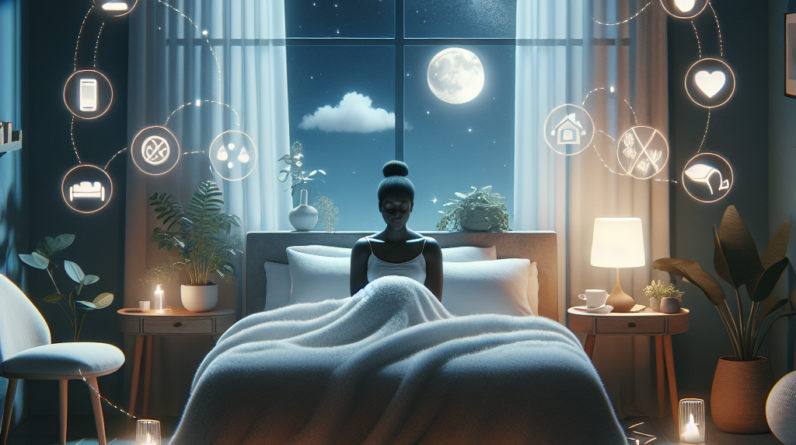
Understanding Sleep Hygiene
The Importance of a Sleep Schedule
I’ve always found that having a consistent sleep schedule is key. Our bodies thrive on routine, and setting a regular bedtime helps signal to our minds that it’s time to wind down. For me, it only took a few nights of straying too far from my usual schedule to see how groggy mornings could get. The trick is to pick a time you can stick to, even on weekends!
Get a Huge Discount and Bonus! Try for 90 Days Risk Free
To create your ideal sleep schedule, try getting up at the same time every day, regardless of when you hit the sack. This consistency helps your internal clock adjust, making it easier to fall asleep at night. I’ve noticed that when I skip this step, it’s like I’m off on some weird sleep adventure – and not the fun kind!
Lastly, it’s crucial to listen to your body. If you’re feeling tired earlier, don’t hesitate to hit the pillow a bit sooner. Over time, you’ll find your sweet spot, and oh boy, the restful nights that follow are absolutely worth it!
Creating a Relaxing Sleep Environment
The bedroom’s vibe can really make or break your sleep quality. I’ve experimented with various setups, and believe me, a calm, clutter-free space works wonders. Soft lighting, comfortable sheets, and a clean atmosphere set the stage for quality rest. Honestly, there’s something about stepping into a cozy room that just makes you feel ready to relax.
Consider the temperature too! I’ve found that a slightly cooler room is where I get the best snooze time. You can even turn on a fan or crack a window if you need some fresh air. Your sleep conditions should mirror what helps you feel good – no one-size-fits-all here!
Lastly, don’t underestimate the power of scents! Lavender, chamomile, and even vanilla can be soothing. I’ve dabbled in essential oils before bed and was pleasantly surprised by how they seemed to ease my mind. You’re creating more than just a sleep space; you’re crafting a sanctuary.
Limiting Screen Time Before Bed
Okay, let’s chat about screens. I used to be a major night owl scrolling through social media, and let me tell you, it took a toll on my sleep. Blue light from our screens can mess with melatonin production, which is basically our body’s natural sleep aid. So if you want to snooze like a champ, consider putting down your phone or tablet at least an hour before bed.
Instead, swap that screen time with calming activities like reading, meditating, or even journaling. I’ve discovered that reflecting on my day or writing down what I’m grateful for not only relaxes me but also helps clear my mind. Plus, it’s a nice way to wind down!
If you absolutely must use your device, consider using blue light-filtering glasses or enabling night shift modes. Whatever it takes to help you chill out and drift off easier – do it!
Get a Huge Discount and Bonus! Try for 90 Days Risk Free
Nutrition and Its Impact on Sleep
Foods that Help You Sleep
Now, let’s talk grub! Did you know what you eat can impact how well you sleep? I’ve made it a point to include sleep-friendly foods in my diet, like almonds, bananas, and even turkey. These foods contain magnesium and serotonin, which really help promote relaxation. Seriously, it’s like they’re nature’s sleepy time snacks!
Avoiding heavy meals right before bed is another rule I try to live by. There’s nothing worse than tossing and turning because you overdid it on dinner. I usually aim to have my last meal at least two to three hours before I intend to sleep. Trust me; your stomach will thank you!
Hydration is important too! But be careful not to chug a ton of water right before bed. I like to drink enough throughout the day so I don’t have to wake up for bathroom trips in the middle of the night. Finding that balance can be a game changer!
Need a Serious Energy BOOST? Huge Discount Try for 90 Days Risk Free
Good Health Solution is Easier Than Most People Think!
Take a Look for Yourself!
Common Sleep Disruptors
There are so many culprits that can disrupt our beauty sleep! Stress tops my list. Life gets hectic, and learning how to manage stress is crucial for good Z’s. I’ve found that practicing mindfulness, breathing exercises, and even a little yoga can help lower anxiety levels before hitting the sack.
Check your caffeine consumption too. If you’re like me and love your coffee, perhaps consider switching to decaf in the afternoon. I used to think I was invincible, but then I realized that it was contributing to my sleepless nights.
And let’s not forget about our furry friends! I adore my pets, but they can sometimes be distracting at night. If you’re waking up to a cat walking across your face or a dog snoring next to you, you might consider having a pet-free zone while you sleep!
Developing a Night Routine
Lastly, a solid nighttime routine can transform your sleep experience. I started creating a wind-down ritual that signals to my body it’s time to mix it up – 1 hour before bed, I turn down the lights, put away my devices, and do something relaxing. Whether it’s a warm bath or some light stretching, it’s all about finding what works for you.
Reading a few pages of a good book can also be therapeutic. But here’s a tip: avoid anything too stimulating. I made the mistake of diving into a thriller one night, and let’s just say it wasn’t the best choice for a peaceful sleep.
Essentially, this routine is about creating that soothing atmosphere that signals to your body, “Alright, it’s time to sleep!” Stick with it, and you’ll notice how your body starts to recognize and embrace that cue.
FAQ
1. What is sleep hygiene?
Sleep hygiene refers to the habits and practices that are conducive to sleeping well on a regular basis. It includes factors like maintaining a consistent bedtime, creating a restful environment, and avoiding stimulants close to bedtime.
2. How does nutrition affect my sleep?
The foods you eat can significantly impact your sleep quality. Consuming sleep-friendly foods like nuts, fruits, and lean proteins can enhance sleep, while heavy or spicy meals before bed can disrupt it.
3. Why is it important to limit screen time before bed?
Limiting screen time before bed reduces exposure to blue light, which can interfere with the production of melatonin, the hormone responsible for regulating sleep. This can lead to difficulty falling and staying asleep.
4. What are some common sleep disruptors?
Common sleep disruptors include stress, caffeine, and an uncomfortable sleep environment. Managing these factors can help improve your sleep quality.
5. What can I do to develop a good night routine?
To create a good night routine, try to wind down an hour before bed. Engage in relaxing activities, limit exposure to screens, and create a calm environment to signal your body it’s time to sleep.







